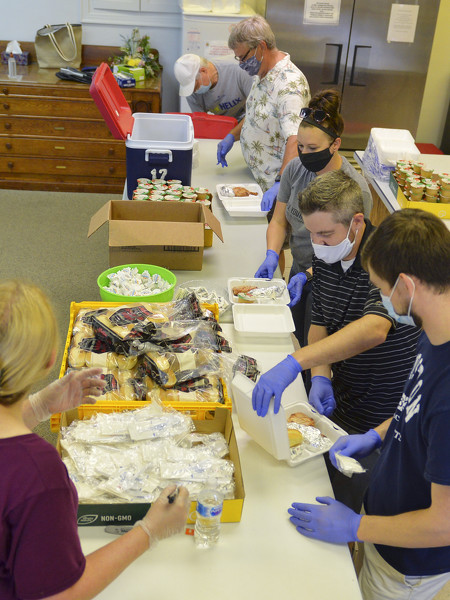Monday, July 20th, 2020
Masks save lives. And yet ...
By Leslie Gartrell
Health experts for months have asked Americans to take precautions to protect themselves and those around them, from the spread of COVID-19 such as frequent hand washing, social distancing and staying home when sick.
However, no precautionary method has drawn quite the same contempt as wearing face masks.
The Centers for Disease Control and Prevention have recommended that Americans wear face masks in public to prevent the spread of the coronavirus since April, a reversal of previous guidlines that suggested masks were unnecessary for people who weren't sick.
"Cloth face coverings are one of the most powerful weapons we have to slow and stop the spread of the virus - particularly when used universally within a community setting," CDC Director Dr. Robert Redfield said in a news release July 14. "All Americans have a responsibility to protect themselves, their families, and their communities."
Yet less than half of Americans are heeding health officials' guidance by always covering their nose and mouth when in public, especially when social distancing is difficult to maintain, according to a Gallup survey conducted June 29-July 5.
The hesitancy or refusal to a face mask could be attributed to a variety of reasons, according to Wright State University-Lake Campus associate professor Dave Hochstein.
The intense polarization of the county has made the act of wearing a mask politically charged. Americans may see the life-and-death decisions they have to make as political choices rather than medical ones.
"We've become so divided that, for some, not wearing a face mask is a visible signal of which group they belong to," Hochstein said in an email to the newspaper. "This becomes particularly powerful when the members of the other group are seen as dangerous and untrustworthy.
"If the only reason to wear a mask is because someone seen as dangerous and untrustworthy says so, you aren't going to have anyone wear a mask."
President Donald Trump advised in early April that his administration recommends Americans wear non-medical cloth face coverings. However, Trump announced he would not wear a mask at the same press briefing when the recommendation was made and only recently has worn a mask in public.
According to the Gallup survey, a majority of Democrats said they wear masks frequently, with 61% responding they always wear face masks and 33% responding they wear them very often.
A majority of Republicans said they wear face masks infrequently - either sometimes (18%), rarely (9%) or never (27%), while 24% always wear them and 22% wear them very often.
However, the aversion to mask-wearing isn't solely political. For some, a major reason is fear, Hochstein said.
"Acknowledging that there's a pandemic by wearing a mask means they have to accept that it is happening and that there are fundamental changes happening in society," Hochstein said.
Hochstein said another possibility is confirmation bias and the low levels of people dying locally. People tend to stay with a decision they've already made and look for information that confirms that decision, Hochstein said.
"If there's not a lot of disconfirming evidence, and they made the decision early on that they wouldn't wear masks because of the inconsistent nature of the information, they'll keep with that decision," he said.
For example, Mercer County has one of the highest per capita rates in the state. With 361 confirmed cases as of Sunday night and a population slightly about 41,000, Mercer County has a per capita rate of 880 cases per 100,000 people.
Yet with 10 deaths, the majority of which were older residents at long-term care facilities, some Mercer County residents may be quick to brush off the notion that COVID-19 is dangerous and spreading in the community.
Hochstein said cognitive dissonance is at the heart of confirmation bias and one of the reasons confirmation bias continues, even if it results in harm.
Cognitive dissonance describes the discomfort people feel when two cognitions, or a cognition and a behavior, contradict each other.
For example, a person may not want to wear a face mask, which is dissonant with the knowledge that wearing a mask can prevent the spread of COVID-19.
In order to reduce that dissonance, a person could start wearing a mask and practice social distancing, or justify their reasoning.
To preserve the belief that they are smart and competent and wouldn't unnecessarily put themselves in harms way, a person could justify not wearing a mask by claiming that masks do more harm than good, denying the pandemic's severity or protesting that their rights are being infringed upon.
So can a person's mind be changed after it's been made up? Hochstein said getting people to change their behavior will be difficult, particularly for people who aren't wearing masks for several of the reasons previously listed.
"Essentially, it will require group members seen as trustworthy to promote mask wearing, be that family members or figures of authority," the associate professor said. "Education by these same people would be helpful as well."
However, Hochstein advised that legislating mask wearing likely would not be helpful if the legislating is being done by people who aren't considered trustworthy.
